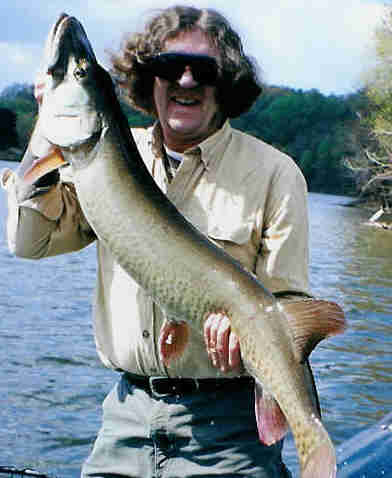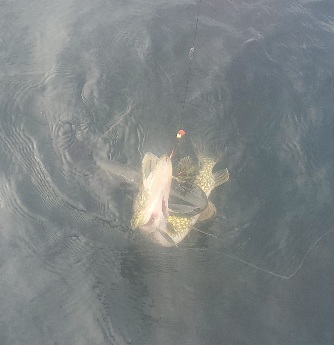|
|
Posts: 431
| Looking for articles/ books that talk about tactics for musky fishing solo.
-How to attach spots
-Bait choices
-When to change baits
-How long to fish spots
etc | |
| | |

Posts: 198
| I fish solo a lot, depending on the wind speed that day I'll usually spot lock and cast from the rear of the boat. I'll fan cast say a dozen casts, then drop back a bit more or move to the left or right. I've always got 3 rods loaded with the baits I want to fish that day. Dozen casts or so per bait until I either get bit or a follow or just a REALLY good feeling lol. I usually fish spots a bit longer as it takes more time to cover it compared to if I had a buddy in the boat. One thing I do however is use a light weight net. I've got a old aluminum salmon net I've re-bagged with a Frabill super deep basket. Super light, easy to handle and I usually end up keeping the fish in the water a longer then if I had an extra set of hands. I lock the net down on the gunwales and the fish is doing it's thing in the net, no worse for wear while I grab the bump board, etc. | |
| | |
Posts: 1621
Location: Brighton CO. | I lot of good advice above, take your time short casts if in cover and dark water (pick it apart) and if it's windy your boat will drift faster, if working clear lake go right down the middle and plot your course. It's harder to work cover in clear water because of casting length. You might have to go thru twice. | |
| | |
Posts: 431
| So fishing solo more casts into spot especially if dark water and may have to go through twice to cover. Less spots in the day | |
| | |
Posts: 515
Location: Ludington, MI | First, the books: I've read them all, but there's not a lot of solo-specific in them. "The Complete Guide To Musky Hunting" is really the bible. "Muskies on the Shield" is very good and the Bible for many older anglers, but tough to find. "25 Can't Miss Patterns" and "Muskies My Way" are very good as well. Joe Bucher's spinnerbait and crankbait books are both very good and he spends a lot of time talking about how to dissect cover. If your state offers Inter-Library Loan, you can save yourself some money and read through these for free before deciding what to buy. (*No disrespect to Musky Strategy, but that's some really deep thinking and more of a 400-level course!)
Solo tips: I fish into the wind with autopilot whenever possible when I'm solo, but if it's over say 15 mph, I put the bow-mount on 3 or 4 or 6 and let it leak downwind. I use the whole boat when I'm alone and cast from all four spots as conditions and cover dictate. You have to be more disciplined about watching for follows because you don't have a partner there to do it for you. (You also need to keep one eye on the SI!) I second the picking cover apart. In calm weather I'll go down a weedline or shoreline and drop casts every two to three feet, just blanketing it. All your questions are good ones, but so situation-specific that they are tough to answer. If it's humid and windy go with fast lures, if it's still and clear go slow. Pick something you believe in and keep it wet. Biggest solo tip: Get a lightweight net and always remember to unfold it before you get started and keep your release tools close!
Edited by tundrawalker00 9/22/2022 4:52 PM
| |
| | |

Posts: 7101
Location: Northwest Chicago Burbs | Personally when I fish alone I fish super fast to search for a pattern or make an educated (ie. usually wildly wrong) guess and fish a specific pattern and type of spot.
I find that the less I bring, the more I catch. If I have too many options, I can get stuck in the "bait changies" and switch over and over and am never happy with what I throw.
| |
| | |
| Retired and living on a lake, I fish solo a lot. I have not found books that address that style of fishing but some good articles. The articles stress some basics such as where you place your release tools, your net, etc. Safety is also important. When by yourself, you can get in trouble and have no one to bail you out.
When by myself, the net is in a very specific position. I don't even have to look, I can just reach down and the handle will be 'right' there. Same with release tools.
On a personal level, I fish a little slower when by myself. And, I probably change style of baits a little more often. When fishing with someone else, if they have top water on, I am throwing something different, etc. | |
| | |

Location: Athens, Ohio | Your real education will come once you hook the fish and try to net it.No book gonna teach that. m | |
| | |

Posts: 543
Location: NW WI | Agree with everyone, partners or not I prefer to comb regardless, I'll add to Slamrs statement myself and say I follow that same discipline in the given circumstance of-small water,Kayak, River.
My trolling motor ain't fancy enough for spot lock, so the wind is your best friend and worst enemy at times.
Hanging live bait is your partner. Breaks take place of conversation, not paying attention is your #1 enemy. | |
| | |
Posts: 396
Location: Northern Illinois | I fish solo a lot. I don't think I do anything different with fishing patterns etc other than I don't have the advantage of running different lure types at the same time (bucktail, rubber, topwater).
Agree that the biggest challenge is the netting. Make sure your net is easily accessible for your position, obviously handle extended, and test for hang ups everyone in a while (not caught on oar, rod, lure etc.). I usually play the fish a little and like to end up with the fish coming in a clockwise last turn where I hold the net in my left hand and guide her in with the rod in the right hand. It obviously doesn't always work out that way. | |
| | |
| 7.62xJay - 9/22/2022 9:47 PM
Agree with everyone, partners or not I prefer to comb regardless, I'll add to Slamrs statement myself and say I follow that same discipline in the given circumstance of-small water,Kayak, River.
My trolling motor ain't fancy enough for spot lock, so the wind is your best friend and worst enemy at times.
Hanging live bait is your partner. Breaks take place of conversation, not paying attention is your #1 enemy.
Good point on paying attention. Had this happen earlier this week. Had been out for a couple hours by myself and at some point kind of zoned out, still casting, working the bait but not fully focused. Suddenly realized I had a follow that I should have seen, been prepared for. Don't know that it would have made a difference, was starting the figure 8 when I noticed but still little disappointed in myself for not really being focused.
When fishing with a partner, you have more going on, some conversation, etc., seems to help with staying alert. | |
| | |
Posts: 1621
Location: Brighton CO. | Growing up had a cousin who was nine years older than me and we fished a lot together and we had lots of fun out in the boat,
especially when I turned drinking age. He never caught a Muskie over 30" because he was always talking and clowning around and not paying attention to his lure. Lots of good times in the boat and we got our butt's crewed too. He died in his 50's and I miss him! We were hacks back then. And if you catch a Northern pull in the stinger before starting the motor!
| |
| | |

Location: PA Angler |
All about baits and everything else is for you to learn. A book or article might help just to read to give you an idea but learning out in the waters and just paying attention is where it’s at. I’ve read some lures from an article and have used them and never caught a thing. I started buying some I thought would work and they do. As for that I think what are they eating and stick with those patterns. Also learn and remember where they like to hide. There’s always a lot of water to cover.
For me it’s just trying to net them as I’ve lost a couple not having the net there or setup. | |
| | |

Posts: 3915
| Ok, check this solo advice....
You want safety, effectiveness and efficiency, all in that order. So, adopt a rule that will help forever. The rule?
Do it all with one hand free.
Stay with me on this.
Wear a good life vest and set everything up in your boat such that you can access light switches, baits, release tools (especially mini bolts (knipex)), the net, your prepped rods, beer, camera, and anything else you might need to use regardless of catching a fish. All with one hand.
So, to start, jacket on and while your motor is warming set the reel drags and load 3-5 rods with the baits you will likely use on the water you're fishing. The lures all from tackle boxes that you can open, grab your bait and close the box with one hand. Baits are already prefect, hooks needle sharp, Suicks are tuned and cranks run true. 90% of the time you'll be holding the rod in one hand and doing everything else with the other. One hand access includes putting everything back where it belongs; baits in the box, tools in the tool hangers (pilers, Knipex mini bolts, de-hookers and files), camera, beer, smokes, everything. Keep a clean boat, always.
Why one hand? Two reasons. First, minimizing down time. "Down time" is any time I don't have a good bait working right in a good place. I'm not a casual fisherman, if I'm out I'm gonzo and my #*#* is in high gear. I'm also a marathon guy, no big deal to fish for 10 or 12 hours. Why not prepare such that I minimize down time?
Second, safety. I'm a marathon, gonzo guy and that's asking for trouble. Fatigue is a big deal. Streamlined processes require less energy and there's less opportunity for operator error. Less risk of getting jammed up running solo with a huge hook in the hand/neck/ball sack. 2.5 safety reason is this...in rough water, or when exhausted but still thrashing the waters, or exhausted but ****ing around in rough water, a free hand means three points of contact as you move around in the boat. This is exactly like climbing a rock wall (no thanks), the safest way to move is when you have three points of contact - two feet and one hand or two hands and one foot. Never reach with a hand or a foot until you're secure with the other three points of contact. And keep the center of gravity low even if you look like a spider. Spiders never dump out into the drink.
I don't think I did a very good job of writing this out, been a long day. To sum it up .... safety > effectiveness > efficiency, all with one hand.
Read up on PERT and CPM - Program Evaluation and Review Technique and Critical Path Method. All about minimizing the time required to complete each task within a process designed to achieve a specific goal.
Hope that's helpful.
Edited by Ranger 9/25/2022 11:25 PM
| |
| | |
Posts: 358
| same applies solo as with others, if your going to fish a spot fish it well. get casts on good spots. that might require speeding up or slowing down.
boat positioning is different as you don't have to worry about anyone else. can move boat to change angles.
i do well paralleling tight to structure (weekline, bar, breakline etc) casting angle parrallel, 45 in, 45 out. you can drift more because if the boat tails out you are not messing up angles for others and spot lock will keep you from drifting off.
longer rods make it harder to net fish by yourself. just have to stay patient and calm it usually works out. but some get away.
i find solo i am much more exploratory and creative. | |
| | |
Posts: 171
Location: Cedarburg, WI. | When I fish solo I typically downsize my baits slightly and cover a lot of water looking primarily for shallow active fish. | |
| | |
Posts: 404
| I am in my early 70s and still fish solo. My approach is to simplify, only have 2 poles rigged and ready to use, remove all clutter, have net open and ready. In re to my net I attach a jigging handle on my net. It is much easier to handle one handed. I pay particular attention to being in the moment, aware of what I am doing and avoid getting into those zones where you get into a cast and retrieve rut. Inattention leads to careless errors. It might seem like overkill but practice getting back into your boat from the water by yourself.Wear a life jacket! | |
| | |
Posts: 1621
Location: Brighton CO. | Great advice above! And not much room for overkill when it comes to Muskies. | |
| |
|
 Fishing solo
Fishing solo Fishing solo
Fishing solo